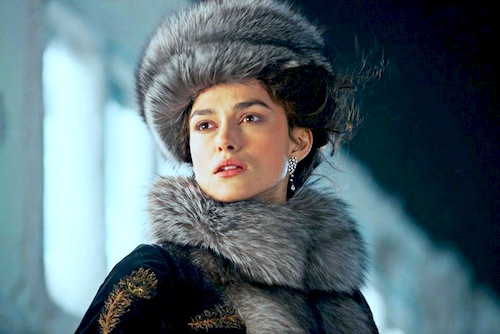By Joe Bendel. Anna Karenina won the game of Russian birth roulette. Born into privilege, she initially enjoyed all the benefits of her well structured life, but lost everything due to a reckless love affair. Such was the price of offending Russian society at a time when it was trying to act French. Notions of social role-playing have now inspired the hyper-stylization of Joe Wright’s take on Tolstoy’s classic Anna Karenina, which opens this Friday in New York.
Everyone is playing their socially expected role you see, so why not set Anna Karenina in a creaky old theater? From time to time, Wright will break away from the stagey confines, particularly when checking in on Levin, the rustic landowner and long suffering friend of Karenina’s ne’er do well brother. Of course, there are also trains – like the one taking the title character to Moscow, where she hopes to provide emergency marriage counseling for said brother and his justly aggrieved wife Dolly. It is sort of a pleasant trip spent in the company of the Countess Vronsky, whose cavalry officer son meets her at the station.
 The mutual attraction between Karenina and Vronsky are immediately evident, only intensifying at an eventful Moscow society ball. Having thrown over the plodding Levin in hopes of landing Vronsky, Dolly’s younger sister Kitty is deeply hurt when the officer ignores her in favor of the married Karenina. Spooked by the prospect of scandal, she hastens back to St. Petersburg and her husband Karenin, a progressive but culturally traditional government official. As everyone should know, Vronsky follows her—and so does scandal.
The mutual attraction between Karenina and Vronsky are immediately evident, only intensifying at an eventful Moscow society ball. Having thrown over the plodding Levin in hopes of landing Vronsky, Dolly’s younger sister Kitty is deeply hurt when the officer ignores her in favor of the married Karenina. Spooked by the prospect of scandal, she hastens back to St. Petersburg and her husband Karenin, a progressive but culturally traditional government official. As everyone should know, Vronsky follows her—and so does scandal.
There have been enough movie and television treatments to support a lengthy compare and contrast session here. In many ways, Tom Stoppard’s adaptation is quite distinctive, establishing a strong contrast between country simplicity and urban hypocrisy, while finally giving Levin his due. However, Wright’s stylistic conceit is far too distracting, taking viewers out of the story time and time again. The theatrical device is not even particularly original, having been used to greater effect in Manoel de Oliveira’s Satin Slipper, Louis Malle’s Vanya on 42nd Street, and several Shakespearean films. Frankly, it is a rather baffling aesthetic choice, considering the whole appeal of a novel like Anna Karenina is the big messy sweeping grandeur of it all.
Nonetheless, there are several outstanding performances in Wright’s film, especially from his lead, Keira Knightley. It is hard to think of anyone else with the same brittle beauty and aristocratic bearing, who can convey burning self-destructive passion and guilt-ridden anguish with comparable power. Yet the real surprise of Wright’s Karenina is Jude Law’s performance as Karenin, the wronged husband. Even though he looks considerably younger than the Karenin as described in the source novel (about twenty years older than his wife), Law creates a deeply sympathetic portrait of a fundamentally decent man, trying to act accordingly, despite the painful embarrassment of the circumstances.

In contrast, the casting of Aaron Taylor-Johnson as Vronsky is a head-scratcher. In truth, Wright lets his Vronsky off rather easily. In previous versions, Vronsky is something of a shallow cad, but here he is more or less a dumb kid who fell in love too young, but that creates a host of dramatic problems. Essentially, Anna Karenina is supposed to fall for Vronsky, because he is manlier than her husband, not vice versa. What she sees in this Vronsky is hard to fathom. I got stuff in the fridge that looks older than Taylor-Johnson and I’m not ready to throw it out yet.
Granted, Wright’s visual approach lends itself to some dramatic transition shots, but it never lets the film settle in and put down roots. Watching it makes one wonder what the director had in mind. Perversely, it is like Wright elicited award caliber performances from Knightley and Law, but then deliberately undermined them the postmodern theatricality and a maddening case of miscasting. There is room for some experimentation when tackling Tolstoy, but it should serve the interests of the picture. For instance, Sergei Solovyev’s relatively recent Russian production of Anna Karenina was considerably more expressionistic than traditional costume dramas, while staying true to the novel’s tone and story.
It is a shame Wright had to be so showy, because there is quite a bit of good stuff in Stoppard’s screenplay and the mostly impressive work from the accomplished ensemble cast. Recommended mostly for Knightley and Law’s diehard fans, Wright’s frustrating Anna Karenina opens this Friday (11/16) in New York at the AMC Loews Lincoln Square.
LFM GRADE: C+
Posted on November 14th, 2012 at 11:14am.